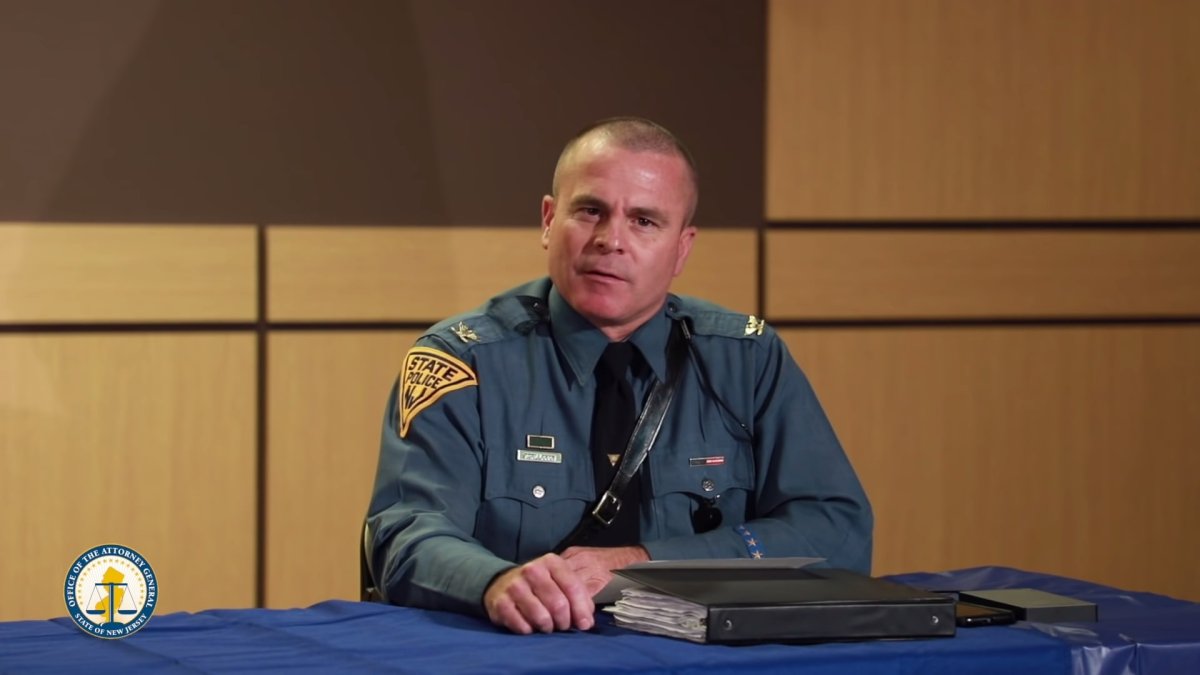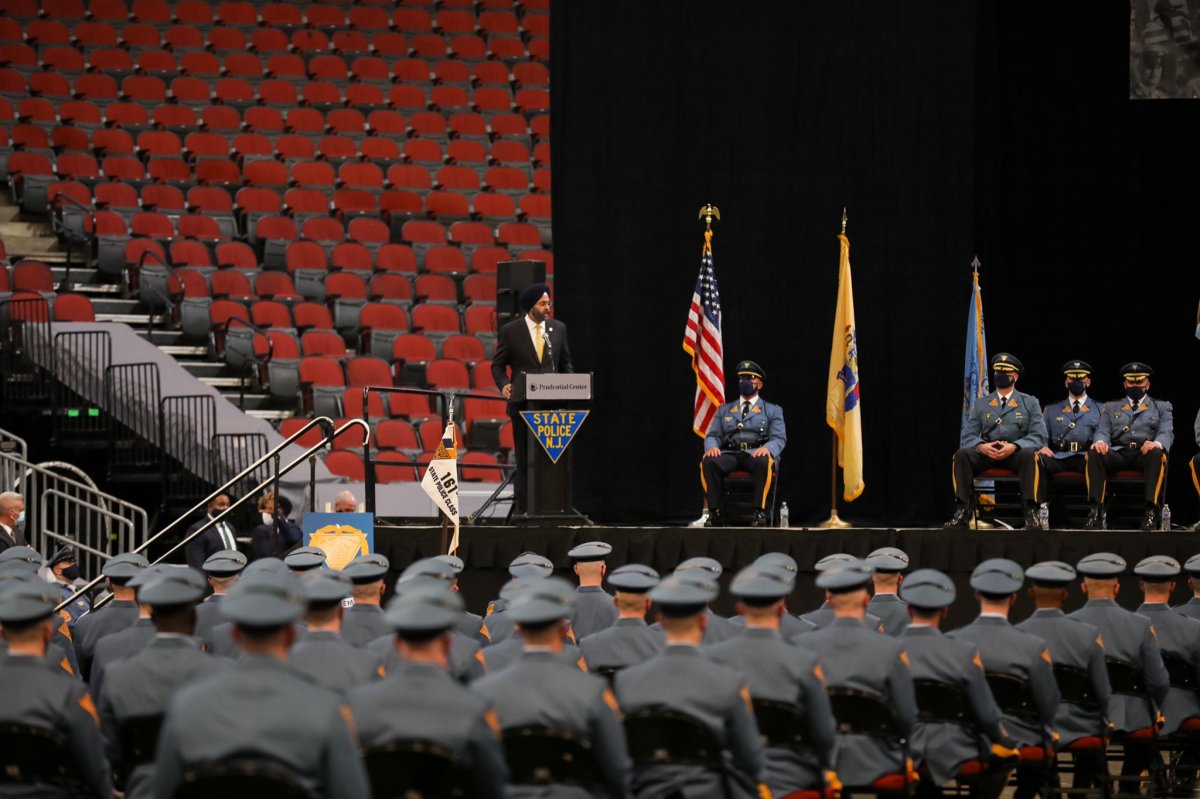Concerns about the leadership of the New Jersey State Police are being raised after a report has confirmed that the force's acting head discussed an open corruption probe of a county prosecutor's office with the prosecutor in question in a meeting deemed questionable by experts and officials.
The sit-down, first reported in June of last year by Newsweek, involved Acting State Police Superintendent Patrick J. Callahan and Sussex County Prosecutor Francis A. Koch meeting with two other officials in March 2017 at the Golden Corner Diner in Bound Brook, New Jersey.
Callahan later testified in a deposition that during the course of conversation the four discussed the fact that one of his troopers had filed corruption charges against Koch's office over a quashed sexual assault case involving a New Jersey woman and the son of a former Morris County official.
The corruption case was later referred to the New Jersey Attorney General's office, and no further action has been taken on it. The trooper who filed the charges was disciplined along with others supporting him, though they later won a labor grievance case against the force, with the exception of two troopers whose charges are still pending.
But concerns surrounding the internal handling of the matter have resurfaced after a 101-page investigative report prepared last month at the request of the New Jersey Attorney General's Office confirmed the controversial meeting.
"A meeting at a diner between Callahan and the target of a corruption probe where the investigation was discussed sounds like a scene out of 'The Sopranos' and not something the acting superintendent of the New Jersey State Police should be doing," one state official, speaking on the condition of anonymity, told Newsweek.
This official quoted another who asked not to be named for fear of reprisal, who said, "If you want to be transparent, you don't hold a meeting at a diner and then only disclose it when you're under oath."

The report, which references Newsweek's original coverage of the incident along with an article in The Star-Ledger of Newark, includes interview responses from all four men who attended the diner meeting.
Koch confirmed that the encounter was the first time he had heard of the corruption probe, for which he said Callahan "wanted to apologize because the troopers had not followed proper protocols" and because "there was a referral of a complaint that your office is corrupt," according to the report.
Callahan, for his part, is quoted in the report describing the meeting as "more of a try to mend fences breakfast." He argued it was important for two officials whose offices interact on a daily basis to maintain their professional working relationship.
The report ultimately found "no wrongdoing" in the affair, but experts were more skeptical, especially as to why the parties chose such an informal setting to discuss the issue.
While the men attributed the decision to inclement weather preventing previous plans to travel by air and the diner's "fairly equidistant" location, according to the report, former prosecutor and retired FBI Assistant Special Agent in Charge of Intelligence and Counterintelligence Scott Olson told Newsweek he'd heard these alibis before and they're "nonsense."
"For me, as a prosecutor and for me as an FBI agent, when you're having a significant conversation about official business, you always have that conversation in an official place," Olson said. "You don't go to a diner, you don't get an ice cream cone somewhere."
He said it puts into question the integrity of Callahan, who has yet to be confirmed for his superintendent position since being nominated by Governor Phil Murphy in May 2018.
"This smacks of backroom dealing. This smacks of somebody who is at a minimum willing and very likely is comfortable with doing side deals," Olson said. "Do you want a guy who does business through confidential side deals and official business being done in off-the-record conversations?" he asked.
New Jersey State Senate President Stephen Sweeney said the meeting would "absolutely" come up in the event a hearing was held to confirm Callahan to his position.
"That meeting does call into question some things that he would have to answer under oath if and when we give him a hearing," Sweeny told Newsweek.
One former New Jersey Democratic Party official who asked to remain anonymous said the new report was an attempt to preempt these questions.
"Of course it exonerated them," the official told Newsweek. "That was the intent by bringing in an outside handpicked law firm. Everyone in New Jersey politics knows, especially Democratic politics, that the end goal here for the governor is to make Patrick Callahan the permanent Colonel of the State Police."
The official does not believe Callahan should be confirmed.
The state of New Jersey has long grappled with issues of corruption, owing both to criminal underworld enterprises that have been somewhat romanticized in pop culture, as well as to real-life scandals that continue to plague the public offices of the Garden State.
New Jersey Senator Robert Menendez managed to win his 2017 reelection bid despite being indicted in 2015 on corruption charges for allegedly accepting generous gifts from a prominent doctor in exchange for favors. The charges were dismissed in 2018, but Menendez was "severely admonished" by the U.S. Senate Select Committee on Ethics and ordered to forfeit the market value of any illicit gifts he received.
Before that, then-Governor Chris Christie's "bridgegate" scandal made national news in 2013 as allegations arose that the governor intentionally shut down lanes of the George Washington Bridge to spite a political opponent who served as mayor of neighboring Fort Lee.
More recent examples exist, including last month's sweep-up of eight politicians accused of conduct described by Attorney General Gurbir Grewal as "old-school political corruption at its worst."

But public officials are striving to change this perception, one that Asha Rangappa, a senior lecturer at Yale University's Jackson Institute for Global Affairs and a retired FBI special agent who specialized in counterintelligence in New York, said has the potential to create serious fault lines in citizens' trust in their officials.
"The rule of law is a lot like a dollar bill, people have to believe in it for it to work," Rangappa told Newsweek. "If people believe that the system is corrupt, then you can do everything by the book, and people will always find ways to delegitimize the outcome, and that harms everybody."
She points to the uptick in public scandals that have rocked the federal government in the four years of former President Donald Trump's administration, a political tenure that ended not only with political unrest but violence as well.
And while a Wednesday morning breakfast among officials at a popular diner in a quiet corner of New Jersey four years ago may not appear to have the same impact, the implications of harming confidence in governing institutions remains the same.
Rangappa said Callahan and Koch's diner meeting was "definitely ill-advised, if not unethical, because of an obligation when you are working in law enforcement and the justice system to always maintain the public's trust in the impartial impartiality and fairness of the process."
David Gomez, an investigations consultant who formerly served as an FBI senior executive and as a member of the Los Angeles Police Department, argued the optics of the meeting alone spell trouble for efforts to maintain an honest law enforcement.
"It's the appearance of inappropriate activity that makes it problematic," Gomez told Newsweek, adding that such a call "shows poor judgment on the part of the acting commissioner of the State Police."
And while ambiguity continues to surround Callahan and Koch's controversial encounter, New Jersey State Troopers Fraternal Association President Wayne Blanchard is confident that the facts of the report exonerate the troopers initially accused of circumventing the system.
His advice to all troopers—of which Callahan continues to be a member—is to tell the truth, as required by oath.
"Every trooper needs to be transparent," Blanchard told Newsweek. "Every trooper is held to that standard, so I would expect all troopers to operate under that guiding principle."
Uncommon Knowledge
Newsweek is committed to challenging conventional wisdom and finding connections in the search for common ground.
Newsweek is committed to challenging conventional wisdom and finding connections in the search for common ground.
About the writer
Newsweek editor at large; former FBI double agent and the author of "How to Catch a Russian Spy"
To read how Newsweek uses AI as a newsroom tool, Click here.








